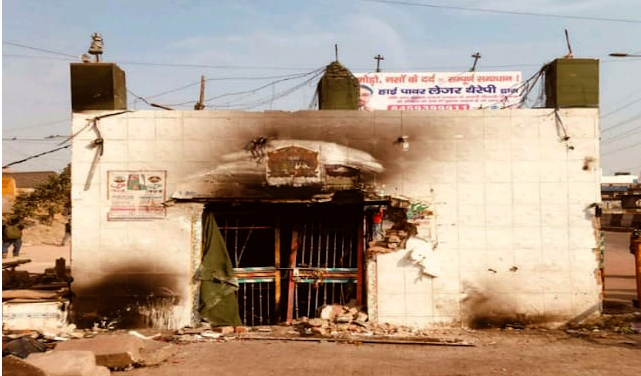
Communal Riots 2020: ‘The Delhi I Inhabit’
By Kanan Gupta, ASP batch of 2020
दिल्ली कहाँ गईं तेरे कूचों की रौनकें
गलियों से सिर झुका के गुज़रने लगा हूँ मैं– जाँ निसार अख़्तर
(Delhi, where is your magnificence lost. I hang my head now when passing through streets)
Jaan Nisaar Akhtar
On the afternoon of February 23, a friend texted me, asking me to ask my family to stay indoors because things were getting bad around there. I called home and found out that violence had broken out. There was news of gun firing outside my brother’s school and he was stuck in there. When he finally got back home, he told me about the crowd of people he saw out on the roads, with rods and sticks in hands, chanting religious slogans.
I was sitting in a class when I first saw the visuals of a petrol pump on the Bhajanpura main road set on fire. Shortly thereafter I received a clip of the mazaar of Chand Baba burning. It was so shocking to see these places, that I was used to seeing almost every other day since my childhood, burn. As a child, I had visited the mazaar a few times with an elder family member, perhaps my grandfather. I had no understanding of religion back then. I bowed my head there just like I did at any temple, as I am sure many other people did. But the mazaar had suddenly become Muslim today, and anything that was remotely Muslim was unacceptable to the mob standing in front of it.
Things got progressively worse thereafter. Shops were identified and targeted based on the owners’ religion. After failing to break the lock of a tailor’s store shutter, the rioters spent an hour and a half trying to cut the shutter down. They piled up all the clothes and equipment on the road and burnt them there. However, as much as they would like to pretend that they were doing all of this in the name of religion, they were careful to keep the nicest of suits for themselves before burning everything else.
Some people protected their neighbours’ shops by physically guarding them or trying to reason with the rioters– but the mobs came back later at night when they went to sleep. The police was still suspiciously absent from the scene, so groups of people started taking turns guarding their streets and colonies. Even those who were inside their homes were unable to fall asleep due to the constant fear and anticipation. Most people went through several sleepless nights until the government finally woke up and paramilitary forces were deployed.
When I was around 13, my 8-year-old brother had asked me, “Musalmaan kya hota hai? Hum musalmaan hain kya?” (Who is a Muslim? Are we Muslims?). I was puzzled about where this was coming from. He told me that some other kid sitting in the bus had asked him about his religion. I felt bad that young kids his age were asking such questions. However, at the same time, I was happy that he was unaware of religion and the divide that it creates. I just told him, “hum kuchh nahi hain” (we are nothing) and asked him to ignore such questions. Today it unfortunately seems impossible that young children could go around without being acutely aware of their assigned religious identities. Some simply cannot afford it, and some will be reminded again and again.
Recently, a 10-year-old kid was gleefully telling my mother that his father got injured. He was taught to be proud of the fact that these injuries occurred when his father was on the roads, as a part of the mob that attacked the mazar mentioned earlier. The most heartbreaking part was seeing people, who we once used to think of as kind souls justify the violence and hate, and even take pride in it.
At this point, I hear that things seem to have returned to normalcy, with a strong paramilitary presence on the roads. And indeed they have, but markets close down a bit earlier than usual every day, people make efforts to return to their homes (except for the unfortunate ones who don’t have any homes left to return to) soon after the sunset, and some feel a weird uneasiness whenever passing through ‘their’ areas. ‘They’ used to be their own people but have been suddenly othered now.
A small ray of hope was to see that a dairy products shop, that had been ransacked and had everything destroyed, has opened again. The destroyed signboard, bearing its name, tells the story of what it had to face.
The barber whose salon was destroyed probably did not have enough capital to start over right away. But more importantly, what has been lost is the capital of trust. More than money, he would require a lot of trust to start functioning as usual here. And this is not something that he can regain on his own. It will have to be collectively supplied to him by the rest of us, his neighbours. But even I don’t have that kind of faith right now. If we failed to protect him once, what right do we have to put him at risk again with our hollow words?
In my early years at Ashoka, I remember that some of my close friends politely told me that they don’t consider anything east of the Yamuna river as Delhi. Of course, this part is not something they would want to associate with the elite city. It is densely populated, poverty-stricken, and settled in an unorganized manner. No wonder that it is the place that was chosen for lighting this fire. You would not be able to imagine the police giving a free pass to such uncontrolled mobs in a place like Connaught Place.
